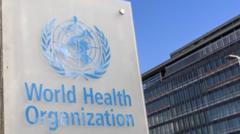The Tanzanian government has dismissed a potential outbreak of the Marburg virus, responding to recent concerns raised by the World Health Organization while assuring the public and international bodies of the country's health monitoring capabilities.
Tanzania Confirms No New Marburg Virus Cases Despite WHO Concerns

Tanzania Confirms No New Marburg Virus Cases Despite WHO Concerns
Tanzania's Health Minister declares suspected Marburg outbreak false after WHO alerts about potential cases.
On Tuesday, Tanzania’s Health Minister, Jenista Mhagama, clarified that the results of the laboratory tests conducted on nine suspected cases reported in the Kagera region returned negative for the Marburg virus. The WHO had alerted the international community about these suspected cases, including eight fatalities within a short timeframe, bringing attention to the country’s health status.
Minister Mhagama stated the country has bolstered its disease surveillance and monitoring efforts, reassuring global health organizations of their commitment to provide updates on any developments. Her statements come in the wake of Tanzania’s first Marburg outbreak earlier this year, which resulted in six deaths in the Bukoba district and lasted almost two months.
The Marburg virus, which exhibits symptoms akin to Ebola, poses significant health risks including fever, severe muscle pains, and potential death due to extreme blood loss. In light of the recent alleged cases, Dr. Tedros Adhanom Ghebreyesus, the chief of WHO, warned of potential additional cases as health surveillance is enhanced in the region.
WHO officials have deployed rapid response teams to monitor the situation, indicating that the risk of the outbreak spreading locally is currently deemed "high" due to Kagera's connectivity with bordering nations like the Democratic Republic of the Congo, Uganda, Burundi, and Rwanda. Despite this, Dr. Tedros advised against any travel or trade restrictions concerning Tanzania, asserting that the global risk remains "low" at this stage.
Local health authorities are determined to prevent the spread of the virus, with ongoing monitoring of healthcare professionals and suspected patients. The Minister, however, did not disclose the exact number of cases investigated during this latest assessment.
Given that the Marburg virus has a fatality rate averaging around 50%, officials have emphasized the importance of continued vigilance. Currently, there are no specific treatments available, though clinical trials are actively underway.
Tanzania remains focused on maintaining and enhancing its health infrastructure as it navigates potential threats to public health while engaging with international partners for ongoing support and collaboration.
Minister Mhagama stated the country has bolstered its disease surveillance and monitoring efforts, reassuring global health organizations of their commitment to provide updates on any developments. Her statements come in the wake of Tanzania’s first Marburg outbreak earlier this year, which resulted in six deaths in the Bukoba district and lasted almost two months.
The Marburg virus, which exhibits symptoms akin to Ebola, poses significant health risks including fever, severe muscle pains, and potential death due to extreme blood loss. In light of the recent alleged cases, Dr. Tedros Adhanom Ghebreyesus, the chief of WHO, warned of potential additional cases as health surveillance is enhanced in the region.
WHO officials have deployed rapid response teams to monitor the situation, indicating that the risk of the outbreak spreading locally is currently deemed "high" due to Kagera's connectivity with bordering nations like the Democratic Republic of the Congo, Uganda, Burundi, and Rwanda. Despite this, Dr. Tedros advised against any travel or trade restrictions concerning Tanzania, asserting that the global risk remains "low" at this stage.
Local health authorities are determined to prevent the spread of the virus, with ongoing monitoring of healthcare professionals and suspected patients. The Minister, however, did not disclose the exact number of cases investigated during this latest assessment.
Given that the Marburg virus has a fatality rate averaging around 50%, officials have emphasized the importance of continued vigilance. Currently, there are no specific treatments available, though clinical trials are actively underway.
Tanzania remains focused on maintaining and enhancing its health infrastructure as it navigates potential threats to public health while engaging with international partners for ongoing support and collaboration.



















